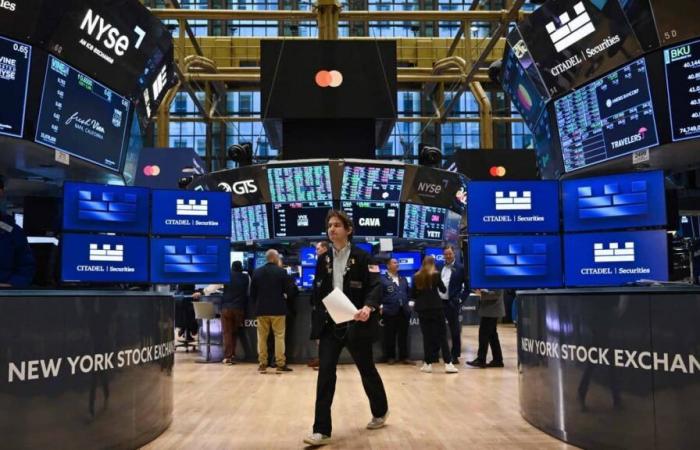The New York Stock Exchange ended sharply lower on Wednesday, frozen by the great caution of the American central bank (Fed), which is preparing to significantly slow down the pace of its rate cuts.
• Also read: The Fed lowers its key rates by 0.25%
The Dow Jones lost 2.58%, the Nasdaq index 3.56% and the broad S&P 500 index 2.95%.
Wall Street reacted very badly to the Fed’s communication, which lowered its key rate by a quarter of a point, but now only expects two new cuts next year, while it was counting on four in september.
The market, which gave the hypothesis of four reductions a probability of 44% a week ago, has suddenly recalibrated its projections and is mainly moving towards two reductions at most.
The bond market took note and the yield on 2-year US government bonds jumped to 4.34%, compared to 4.24% the day before at closing.
The stock market indices plunged.
“The magnitude of this ebb indicates that the Fed took the market by surprise,” commented Sam Stovall of CFRA. The Federal Reserve “has cut its forecast for rate cuts in half and is hinting that we will be lucky if they come true.”
“This is a new phase and we are going to be cautious about future rate cuts,” warned the president of the institution, Jerome Powell, during his press conference.
“The market is reacting to the fact that the Fed admits that there is uncertainty” about the trajectory of its monetary policy, explained Sam Stovall. “And if the Fed is wondering, how can investors have certainty?”
“Powell and others cannot afford to be wrong again about inflation while the risks of an acceleration (of prices) persist,” underlined Charlie Ripley, of Allianz Investment Management, which encourages them to caution.
Jerome Powell also indicated that some members of the Fed had included, in their forecasts, the possible effects of the measures of the future Trump administration, which many expect to be inflationary in nature.
Already feverish in recent days, the New York market became even more tense on Wednesday. The VIX index, which measures investor nervousness, soared by 59%, a movement of rare violence.
“It’s almost as if the market peaked at the end of November,” observed Sam Stovall. “This could encourage taking profits now. Maybe Santa has already gone on vacation.”
The Nasdaq particularly suffered from the backlash, in particular Tesla (-8.28%) and the semiconductor manufacturers Broadcom (-6.91%) and Micron (-4.33%), which had survived until now.
The most volatile values were targeted, such as the automobile manufacturer Rivian (-11.16%), the cryptocurrency exchange platform Coinbase (-10.20%) or the specialist in the sale of Affirm online credit (-10.65%).
The Dow Jones fared barely better, posting a tenth consecutive session in the red, a first in 50 years. The venerable index was weighed down in particular by financial stocks, for which the persistence of a high interest rate environment is a handicap.
Goldman Sachs (-4.25%), American Express (-4.50%) and JPMorgan Chase (-3.35%) thus experienced an eventful session.
Paradoxically, the UnitedHealth group, second weighting in the Dow Jones, was the only one to perform well (+2.92%), its valuation being considered attractive after a drop of 20% since the assassination of the boss of its insurance branch illness, Brian Thompson, in New York, early December.
Elsewhere on the stock market, the agri-food group General Mills (-3.06%) paid the downward revision of its annual forecasts, due to increased promotional spending (-2.93%) after quarterly results better than expected.






